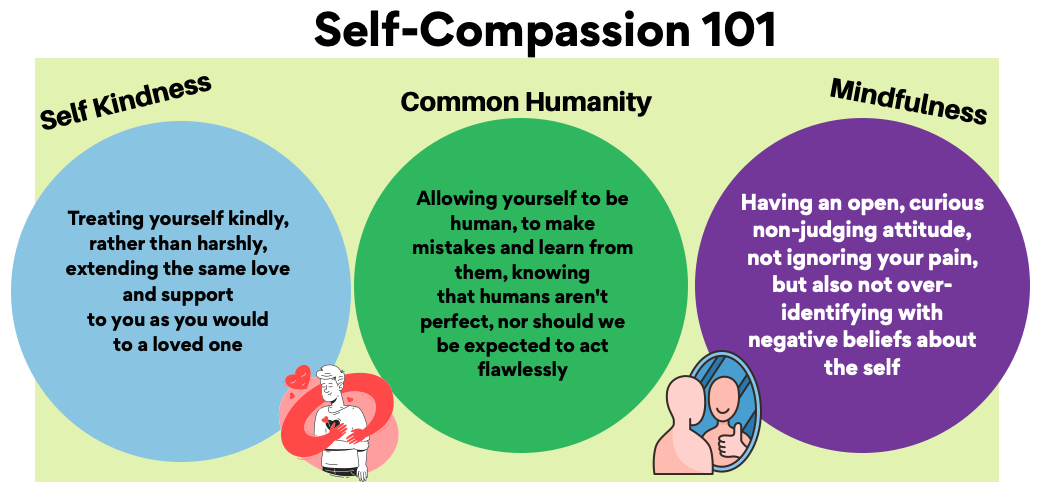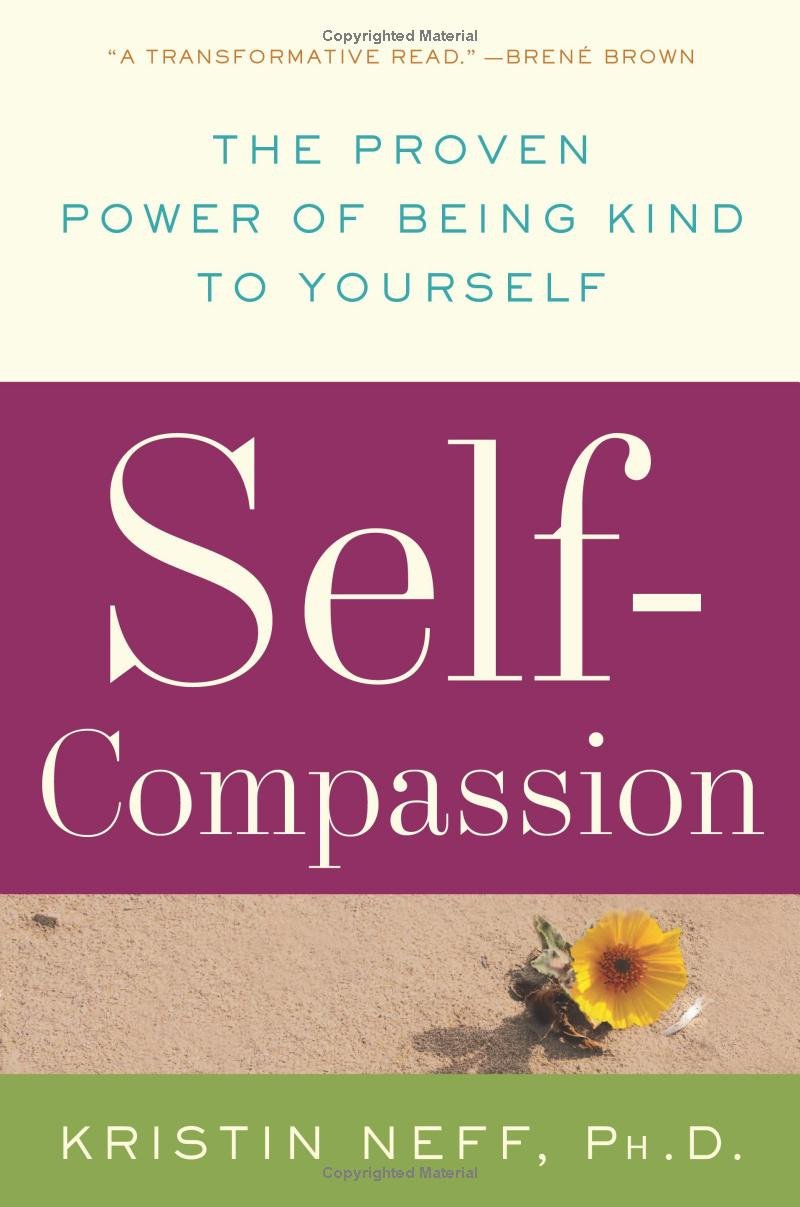Self-Compassion
In this tutorial, we explain how to become more self-compassionate and how it can help boost performance. We don't need to be harsh on ourselves when we fail or don't live up to our own high expectations. Be gentle and kind to yourself.

Transcript
Seena L Haines: Hey there it's Seena
Stuart T Haines: and I'm Stuart.
Seena L Haines: Welcome to the Wellbeing Elixir.
Stuart T Haines: In today's Aliquot & Experiment, we're gonna be talking about self-compassion.
Seena L Haines: You may be wondering, so what's an aliquot? An aliquot is something taken from a larger hole. It's a small sample.
Stuart T Haines: And we have an experiment that you can try at home.
Seena L Haines: One of the ingredients to living a vibrant and happy life is to be a good friend to yourself. Many of us, particularly those who are high achievers, people who constantly strive to be the best, personally and professionally, can be really hard on themselves. If things don't turn out just as we hoped. We don't live up to our own high expectations. Let some people down.
We often talk to ourselves in very hurtful ways.
Stuart T Haines: Now it's not uncommon for people to believe that we need to be hard on ourselves, that if we fail or mess up, we shouldn't be condoning or accepting these disappointments. We need to be a harsh judge in our heads, to set us straight, to motivate us, to get us back on track. We just can't let ourselves off the hook.
Seena L Haines: But research tells us that harmful self-talk and self-bullying do not lead to better performance. In fact, the opposite is true. It often leads to self-blame, diminishes our self-confidence, and is associated with depression and other mental health concerns. So, instead of being a harsh judge, we need to be more self-compassionate.
Stuart T Haines: Now, according to Kristen Neff, who is considered among the leading researchers in this field, self-compassion can be enhanced through kindness in self-talk, by recognizing our common humanity, and by observing our emotions in a non-judgmental way.
Seena L Haines: To cultivate kinder self-talk. Try to be your own best friend. What would you say to a friend who made a mistake? Maybe they didn't get the job they were hoping for, but they recently failed an exam. I'm sure you wouldn't use hurtful words or make a statement like:
"You're such a loser."
But sadly, that's what many of us do to ourselves with our own harsh self-talk. Instead, be gentle, softer. Recognize that the experience of failing is painful, and instead of getting angry with yourself, use a soothing, reassuring tone.
Stuart T Haines: Now, one of the things that helps me be more kind to myself is to recognize that we all have failings and shortcomings. We all are imperfect. And we all suffer losses. Whatever struggles I might be experiencing, well, they're not new in this world. It's not something that's happening to me alone. To fail, to struggle, to mess up. That's a universal human experience.
Seena L Haines: And lastly, we could learn to be more self-compassionate by being more aware of our thoughts and emotions. This is where mindfulness can be so helpful. Instead of labeling yourself as a:
"loser",
or "I'm no good",
or "I am a bad person."
We can learn to step into being more of an observer, to see the situation for what it truly is, with more openness and clarity, and to acknowledge our negative thoughts without exaggeration or suppression.
Our goal is to adopt a receptive state of mind, recognizing when negative thoughts emerge. And simply observing them in a nonjudgmental manner.
Stuart T Haines: So how can we strengthen our ability to be self-compassionate? Well, here are a few things you can experiment with to grow self-kindness when you're under pressure in everyday situations.
Seena L Haines: First, try to imagine a time when a close friend admitted to you that they were struggling in some way. Think about how you responded — what you said and the tone of your voice. Now, visualize talking to yourself with the same kindness when you're struggling.
Stuart T Haines: Second, remind yourself that everyone struggles. That everyone messes up. This is a universal experience. You're not condoning anything. And you're not being complacent. Gently challenge yourself to do better.
Seena L Haines: And you can try to find the silver lining by asking yourself: What is the important lesson you are learning in this situation? How can you learn and grow from the experience? Use these feelings of disappointment to respond in a constructive way.
Stuart T Haines: Self-compassion is learning how to talk to yourself in positive ways when you fail. It's not about giving up or giving yourself permission to behave the same way in the future. It's about being warm and supportive so that you can become a better person.
Seena L Haines: And finally, one way to become more compassionate to yourself and others is to engage in a loving-kindness meditation. You can check out our guided meditations on our website, which includes a loving-kindness meditation. Remember, building your mindfulness muscle can help you become more aware of your thoughts; to simply observe them, and let them go.
Stuart T Haines: Aliquots and Experiments is produced by yours truly, Stuart Haines.
Seena L Haines: Seena Haines. You can find more resources, yoga, and reflective essays on our website the Wellbeing Elixir. As well as the Yoga Apothecary YouTube channel.
Stuart T Haines: And if you're not already a member, please sign up at wellbeingelixir.org and join our community of practice, where we explore the ingredients for a vibrant, happy life.
Seena L Haines: And if you found today's episode helpful, please be sure to rate us, leave a comment, and pass it along to a friend. Namaste.
Stuart T Haines: Namaste.
Resources
If you'd like to learn more about self-compassion and how to be more kind to yourself, check out this book:
Neff K. Self-Compassion. The proven power of being kind to yourself. Stop beating yourself up and leave insecurity behind. Harper Collins: New York, 2011.
Quote to Contemplate
People are like stained-glass windows. They sparkle and shine when the sun is out, but when the darkness sets in, their true beauty is revealed only if there is a light from within.
-Elisabeth Kubler-Ross, Swiss-American psychiatrist, a pioneer in near-death studies, and author of On Death and Dying

